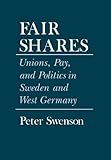Fair Shares : Unions, Pay, and Politics in Sweden and West Germany / Peter A. Swenson.
Material type: TextSeries: Cornell Studies in Political EconomyPublisher: Ithaca, NY : Cornell University Press, [2018]Copyright date: ©1989Description: 1 online resource (272 p.)Content type:
TextSeries: Cornell Studies in Political EconomyPublisher: Ithaca, NY : Cornell University Press, [2018]Copyright date: ©1989Description: 1 online resource (272 p.)Content type: - 9781501717673
- 331.88/0943
- HD6757.S94 1989
- online - DeGruyter
| Item type | Current library | Call number | URL | Status | Notes | Barcode | |
|---|---|---|---|---|---|---|---|
 eBook
eBook
|
Biblioteca "Angelicum" Pont. Univ. S.Tommaso d'Aquino Nuvola online | online - DeGruyter (Browse shelf(Opens below)) | Online access | Not for loan (Accesso limitato) | Accesso per gli utenti autorizzati / Access for authorized users | (dgr)9781501717673 |
Browsing Biblioteca "Angelicum" Pont. Univ. S.Tommaso d'Aquino shelves, Shelving location: Nuvola online Close shelf browser (Hides shelf browser)

|

|

|

|

|

|

|
||
| online - DeGruyter Postmodern Sublime : Technology and American Writing from Mailer to Cyberpunk / | online - DeGruyter Reading Matters : Narrative in the New Media Ecology / | online - DeGruyter Ghostwriting Modernism / | online - DeGruyter Fair Shares : Unions, Pay, and Politics in Sweden and West Germany / | online - DeGruyter Phrasikleia : An Anthropology of Reading in Ancient Greece / | online - DeGruyter "Getting Paid" : Youth Crime and Work in the Inner City / | online - DeGruyter Ethics along the Color Line / |
Frontmatter -- Contents -- Acknowledgments -- Abbreviations -- Introduction: Beyond The Wage Struggle -- Part I: Pay Structure And The Moral Economy -- 1. Pay Norms and Union Leadership -- 2. Centralized Unions: Shaping the Moral Economy -- 3. Rank-and-File Rebels: Enforcing the Moral Economy -- PART II: UNIONS IN THE POLITICAL ECONOMY -- 4. The Wage Policy Trilemma -- 5. Resolving the Trilemma. Unions in Sweden -- 6. Divided by the Trilemma: Unions in West Germany -- Conclusion: The Terms of Solidarity -- APPENDIX: Relative Pay in Swedish and West German Industry, 1960—1977 -- Bibliography -- Index
restricted access online access with authorization star
http://purl.org/coar/access_right/c_16ec
Conflict between labor and capital reflects the competitive and conflict-laden relations within the working class itself, Peter Swenson maintains. Fair Shares examines the internal conflicts of organized labor regarding distribution of wages in order to explain both union leaders' market-structuring objectives in the "political economy", and their imperative to shape and fulfill workers' notions of pay fairness in the "moral economy". Swenson develops an innovative theoretical approach to labor politics through a detailed comparative analysis of union centralization and collective bargaining in Sweden and Germany since the turn of the century.To create solidarity and overcome workers' opposition to centralized control of the labor movement, Swenson argues, union leaders depend heavily on moral appeals concerning fair pair distribution and on success in fulfilling workers' expectation of fairness. Swenson interprets union politics as the attempt to overcome what he calls the "wage policy trilemma"
Mode of access: Internet via World Wide Web.
In English.
Description based on online resource; title from PDF title page (publisher's Web site, viewed 26. Apr 2024)


